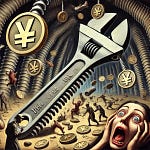In today's episode of "Holy Macro," we're exploring the often-unspoken emotional landscape of trading with the seasoned trader Jason Shapiro. Despite his extensive experience and disciplined approach, Jason candidly shares that losses still affect him—reminding us that even the most seasoned traders are not immune to the emotional impacts of the markets.
Jason emphasizes the importance of a solid, trusted process in navigating these challenges. He reveals that adhering strictly to his trading process provides him a crucial anchor, maintaining discipline amidst the inevitable ups and downs. Beyond the mechanics of trading, Jason discusses how incorporating meditation into his daily routine, a practice he adopted during his time in Asia, plays a pivotal role not just in his trading life but in overall well-being. He advocates that meditation can be transformative, offering profound benefits that extend well beyond the trading desk and into every aspect of life.
Now, let’s look in to what the main lesson is from the Market Wizards series.
Jason mentioned that you “should not listen to us” but listen to the legends that everyone looks up to and what did they say. For those who have not read the book, here are some of the main names. (Also read the book!)
Paul Tudor Jones - Known for his macroeconomic approach to trading, especially in futures markets, Jones gained fame for predicting and profiting from the 1987 stock market crash.
Bruce Kovner - A disciplined trader who started with a mere $3,000 and turned it into billions, Kovner was known for his thorough research and risk management skills.
Richard Dennis - Famous for his "turtle trading" experiment, where he trained novices to become expert traders, Dennis made his fortune in the commodity futures markets.
Michael Marcus - Another trader who turned a few thousand dollars into millions, Marcus was known for his bold trades in currency and commodity markets.
Ed Seykota - A pioneer in computerized trading systems, Seykota's trend-following approach has influenced generations of traders.
Jim Rogers - Co-founder of the Quantum Fund with George Soros, Rogers is known for his global macro strategies and his bullish outlook on commodities.
Stanley Druckenmiller - Also a former trader at Soros' Quantum Fund, Druckenmiller played a key role in trades that broke the Bank of England in 1992, earning him and Soros considerable fame and profit.
Bill Lipschutz - Known as the "Sultan of Currencies," Lipschutz was a highly successful forex trader at Salomon Brothers
Ray Dalio - Though not featured in the initial series, Dalio is often associated with the wisdom of Market Wizards due to his establishment of Bridgewater Associates and his role in developing risk parity and other innovative investment strategies.
and many more…
What I find interesting is not that these traders had such contrasting styles but what is similar.Risk Management is Paramount: Always prioritize protecting your capital. Limit losses on each trade through strict use of stop-loss orders or other risk management techniques. The goal is to survive the bad periods so you can thrive during the good ones.
Develop a Trading Plan: A comprehensive trading plan is crucial. This plan should include strategies for entry, exit, and risk management. Stick to this plan consistently, making adjustments only when your trading data suggests it's necessary, not based on emotions.
Most importantly know exactly where you are getting out before you get in.Stay Disciplined: Discipline in following your trading plan and rules is essential. Avoid the temptation to chase losses or deviate from your strategy during periods of emotional volatility.
If you can’t stick to your plan, nothing else matters.Be Patient: Wait for the trading setups that fit your strategy instead of forcing trades out of impatience. Successful trading often involves acting like a predator, waiting patiently for the right opportunities.
No trade is sometimes the right trade.Continuous Learning and Adaptation: The markets are always changing, and successful traders need to evolve with them. Continuously analyze your trades and market conditions to refine your strategies.
https://www.trendfollowing.com/whitepaper/Edwin_LeFevre_Reminiscences_of_a_Stock_Operator.pdf
Read this to understand the trading journey.Understand the Psychological Aspect: Trading is not just about strategies and economics; it's also highly psychological. Work on understanding your emotional responses to winning and losing and manage these emotions effectively.
Use Leverage Cautaneously: While leverage can amplify returns, it also increases potential losses. Use leverage wisely and never to the extent that a single bad trade could significantly harm your capital.
Diversify Wisely: Diversification can help spread risk, but excessive diversification may dilute profits. Balance is key, and it's important to diversify within the scope of your expertise.
Know When to Cut Losses: One of the hardest but most crucial skills is knowing when to exit a losing position. Protecting your capital should be a top priority, and sometimes that means acknowledging a mistake and moving on.
Record Keeping: Maintain detailed records of all trades, including reasoning for entry and exit and the emotional state at the time. Review these to learn from past actions and refine future strategies.
These are some of the core principles that have guided some of the most successful traders featured in the "Market Wizards" series.
Our first red bar in this model since April. Next week will be crucial to see where we end up by the end of the month.
The equal weight SPX (RSP) has made a new high.
The market over the last 5 days.
The market over the last 6 months.
Overall the market just looks like it is digesting a massive rotation. Next week I would like to see a rotation continue in to banks, small caps and energy. If we see that, this pull back is most likely short lived.
Especially because a risk on signal like Bitcoin is moving like a bat out of hell!
Warm regards, Jason Perz
YouTube: @againstalloddsresearch https://www.youtube.com/channel/UCLvDNCnhNQbQnABUSFbwagg
Twitter: @jasonp138
Substack: aaoresearch.substack.com
Against All Odds Research
Save the bees
https://www.biologicaldiversity.org/campaigns/saving-the-insects/native-bees.html?gad_source=1




















Share this post